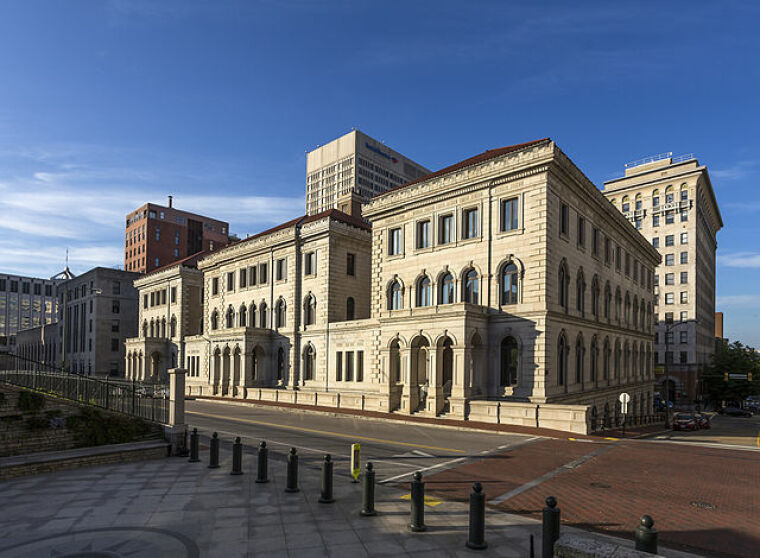Christian prayers at government meetings don't violate church-state barrier, court rules

The 4th U.S. Circuit Court of Appeals has ruled that Christian-only prayers offered by elected community leaders at the beginning of government meetings in Rowan County, North Carolina, did not violate the separation of church and state.
In the 2-1 decision on Sept. 20, Judges G. Steven Agee and Dennis W. Shedd overturned a district court decision that considered the practice to be a violation of the constitution, Richmond Free Press reported. Judge J. Harvie Wilkinson III disagreed with the two judges arguing that they were allowing a seat of government to begin "to resemble a house of worship."
The court decision involving Rowan County also affected the prayer practices in other states including Virginia, North and South Carolina, West Virginia and Maryland. It expanded on the 2014 Supreme Court ruling that upheld the practice of the town of Greece in New York, allowing clergy to open government meetings with prayers.
"Under the Supreme Court's most recent decision explaining legislative prayer, Town of Greece v. Galloway, we find the Board's legislative prayer practice constitutional," Agee wrote in the decision.
"There is a clear line of precedent not only upholding the practice of legislative prayer, but acknowledging the ways in which it can bring together citizens of all backgrounds and encourage them to participate in the workings of their government," he continued.
Agee pointed out that the long-standing practice of legislative prayer, including those that were led by lawmakers, has been accepted as a form of religious observance.
"We decline to accept the district court's view that legislative prayer forfeits its constitutionally protected status because a legislator delivers the invocation," he added.
The American Civil Liberties Union (ACLU) filed a petition last week asking the 4th Circuit Court of Appeals to reconsider the decision.
The petition was filed on behalf of three Rowan County residents Nancy Lund, Robert Voelker and Liesa Montag-Siegel, who said they felt coerced to join the prayers.
The ACLU contended that the commissioners intended the audience to participate by directing them to stand up for the prayers and by starting with phrases similar to "let us pray" or "please pray with me."
The group argued that the decision would erode constitutional limitations on legislative prayers if it is allowed to stand.
 Christians don't have to affirm transgenderism, but they can’t express that view at work: tribunal
Christians don't have to affirm transgenderism, but they can’t express that view at work: tribunal Archaeology discovery: Medieval Christian prayer beads found on Holy Island
Archaeology discovery: Medieval Christian prayer beads found on Holy Island Presbyterian Church in America votes to leave National Association of Evangelicals
Presbyterian Church in America votes to leave National Association of Evangelicals Over 50 killed in 'vile and satanic' attack at Nigerian church on Pentecost Sunday
Over 50 killed in 'vile and satanic' attack at Nigerian church on Pentecost Sunday Ukrainian Orthodox Church severs ties with Moscow over Patriarch Kirill's support for Putin's war
Ukrainian Orthodox Church severs ties with Moscow over Patriarch Kirill's support for Putin's war Islamic State kills 20 Nigerian Christians as revenge for US airstrike
Islamic State kills 20 Nigerian Christians as revenge for US airstrike Man who served 33 years in prison for murder leads inmates to Christ
Man who served 33 years in prison for murder leads inmates to Christ


 Nigerian student beaten to death, body burned over ‘blasphemous’ WhatsApp message
Nigerian student beaten to death, body burned over ‘blasphemous’ WhatsApp message 'A new low': World reacts after Hong Kong arrests 90-year-old Cardinal Joseph Zen
'A new low': World reacts after Hong Kong arrests 90-year-old Cardinal Joseph Zen Iran sentences Christian man to 10 years in prison for hosting house church worship gathering
Iran sentences Christian man to 10 years in prison for hosting house church worship gathering French Guyana: Pastor shot dead, church set on fire after meeting delegation of Evangelicals
French Guyana: Pastor shot dead, church set on fire after meeting delegation of Evangelicals ‘Talking Jesus’ report finds only 6% of UK adults identify as practicing Christians
‘Talking Jesus’ report finds only 6% of UK adults identify as practicing Christians Mission Eurasia ministry center blown up in Ukraine, hundreds of Bibles destroyed: 'God will provide'
Mission Eurasia ministry center blown up in Ukraine, hundreds of Bibles destroyed: 'God will provide' Church holds service for first time after ISIS desecrated it 8 years ago
Church holds service for first time after ISIS desecrated it 8 years ago Burger King apologizes for 'offensive campaign' using Jesus' words at the Last Supper
Burger King apologizes for 'offensive campaign' using Jesus' words at the Last Supper Uganda: Muslims abduct teacher, burn him inside mosque for praying in Christ’s name
Uganda: Muslims abduct teacher, burn him inside mosque for praying in Christ’s name